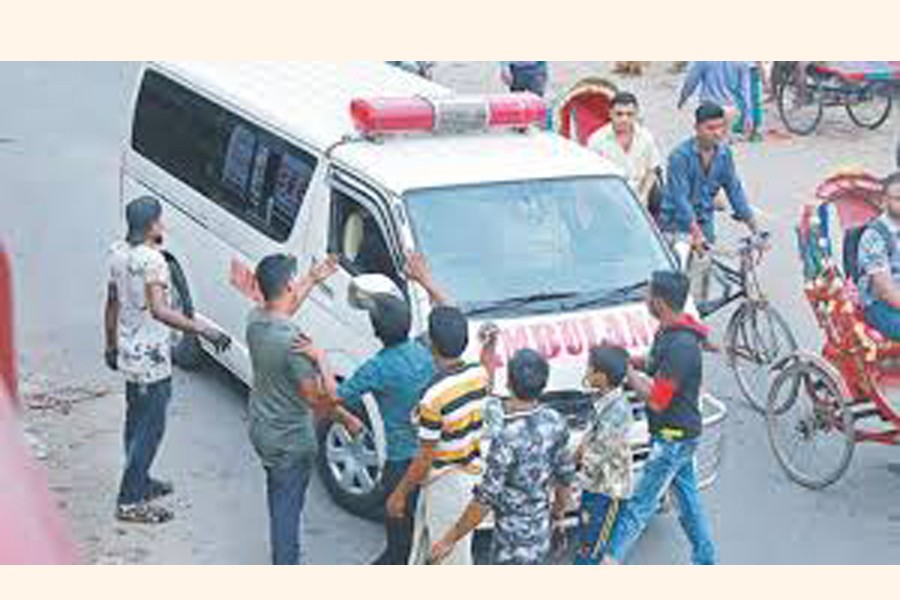The recent 48-hour strike, enforced countrywide by road transport workers, has caused an outcry among many-with rights activists putting the blame partly on the state because of its inaction to ensure citizens' safety. The eventful protests by strikers had various aspects to look into, including the smearing of moving people's faces with burnt engine oil, plights of passengers and patients, halting the movement of even ambulance-like emergency vehicles, etc. But the most appalling one, perhaps, was the death of three innocent babies who met the tragic end of their lives.
The conscious section of the citizenry including rights groups and road safety campaigners raised their voice against the whimsical actions in the name of strike by the transport workers, social media were awash with criticisms targeting the excesses. Audio-visual evidences of all those mindless actions were also being shared online. The country's apex court issued an order to take appropriate action against the strikers responsible for the infants' death and creating chaos during the action-packed strike, and at least 160 were accused in a case filed in connection with obstructing an ambulance carrying a baby patient during the strike that led to premature death of the infant.
Transport workers enforced the strike to press home an eight-point demand including making all offences under the recently-passed Road Transport Act bailable, cancelling a provision that allows a driver to be fined up to Tk 500,000 for involvement in a road crash, lowering minimum educational qualification required for a driving licence from class eight to class five, their representation in investigation committees that probe road accidents, ending harassment on roads by police, and imposing fines by following the wage scales.
On the first day of the two-day strike, lives of two baby girls - seven-day-old and eleven-month-old - were cut short as their families could not take them to hospital due to the strike in Moulvibazar's Barlekha Upazila. The next day, a two-day-old baby boy suffering from pneumonia, breathed his last on his father's lap on the way to the Sadar Hospital in Sunamganj as the workers were not allowing the ambulance to move on. "What was my newborn son's fault? I begged them to let us pass, but they did not," bemoaned the tearful father.
Perhaps, this country has seen it never before that ambulances or vehicles carrying patients were obstructed during any strike. Burnt engine oil has never been smeared on anyone's face. While doing so, the rowdy transport workers did not even spare the female students. With such activities, they might have wanted to spread a sense of panic while also showing their wanton grip on the transport sector.
However, despite the deaths the police could not take any action against anyone as they were still waiting to record any complaint. A Supreme Court lawyer, however, said those who created obstructions on roads could be accused of killing the babies and the police could take legal action on their own. Observers say the babies' lives could have been saved, had the authorities acted timely. Demanding justice, they urged the authorities to take sensible precautions in a situation like this so that no precious life meets an untimely end.
Against the backdrop of what happened on the roads and highways during the strike, one may find it logical to ask some questions- who'll take responsibility for those deaths? Did they lose their humane character? Why did they throw used engine oil at the people? Why did they break windows of vehicles?
Workers should remember that they have the right to go on strike, but a person also has the right to obey or defy it. Hence, those, who enforced the strike, in no way can avoid the responsibility for the deaths. At the same time, the state also cannot avoid its fair share of responsibility, as such deaths could have been avoided, had it acted timely and taken steps. But it was surprising to see how the state kept silent. The state could have taken steps, and it can still do, if it wants, since this is what the state is entrusted with. Even the National Human Rights Commission denounced the strike and said causing sufferings to the public, hurting businesses and humiliating people in the name of realising demands are unpardonable crimes and violation of human rights.
A strike can be observed in many ways-albeit following some rules and accepted norms. Only a couple of months back, students across the country showed how to handle an emergency situation skilfully during their demonstrations for road safety. Like them, the transport workers could take time to go on the strike. They could serve a notice on the authorities 15 days before observing the strike. However, now the only thing that one can expect is that the government carefully plays a proactive role and takes measures so that people do not have to suffer and no life is lost on roads and highways.


